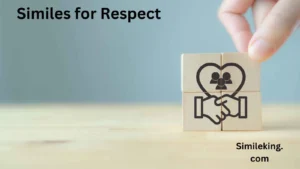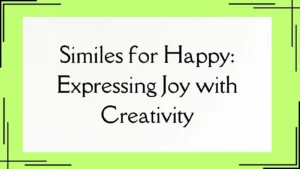Sadness is a universal emotion that everyone experiences at different points in life.
Whether it’s due to personal loss, disappointments, or a general feeling of melancholy, the need to express sadness is something we all encounter.
In our daily conversations, it’s essential to communicate our emotions clearly while considering the context and the tone of our message.
The phrase “feeling sad” can be quite direct, and sometimes, it’s beneficial to use alternatives that convey a similar sentiment but with more nuance.
This article explores over 15 similes for being sad, offering various polite, professional, and casual alternatives to this common phrase.
The goal is to help you choose the best expression depending on the situation, whether you’re talking with a colleague, a close friend, or someone you don’t know well.
1. Simile for Sadness in Polite Contexts
When you’re interacting in more formal or polite settings, it’s important to avoid overly emotional expressions that might sound too personal or inappropriate. Here are a few polite alternatives to “feeling sad”:
1.1. Like a Cloudy Day
In formal settings, comparing your emotions to a cloudy day is a gentle way to express sadness without sounding too dramatic. This simile conveys a sense of feeling down without delving into deeper, more uncomfortable emotional states.
- Example: “I’ve been feeling a bit like a cloudy day lately, just not as bright as usual.”
1.2. Like a Wilted Flower
This comparison suggests that you’re not as vibrant or lively as you’d normally be. It’s an elegant way to indicate that something is affecting your mood.
- Example: “I’m feeling a bit like a wilted flower at the moment. I think I need some time to recover.”
1.3. Like a Drooping Willow
The image of a drooping willow tree can signify quiet sorrow or a subtle sense of loss. It’s a polite way to express that you’re feeling down without being too blunt.
- Example: “I’ve been feeling like a drooping willow recently, not quite myself.”
1.4. Like a Faded Photograph
This simile conjures an image of something once full of life now losing its clarity, much like how your emotions might feel when you’re down.
- Example: “It’s hard to explain, but I feel like a faded photograph these days—like I’ve lost some of my color.”
2. Simile for Sadness in Professional Contexts
In the workplace or other professional environments, it’s crucial to remain diplomatic and composed, even when expressing that you’re not feeling your best. Here are a few professional alternatives:
2.1. Like a Rainy Afternoon
A rainy afternoon can imply a temporary but noticeable dip in mood. It’s not too personal, but still conveys that you’re feeling somewhat subdued.
- Example: “I’ve been feeling a bit like a rainy afternoon, but I’m working through it.”
2.2. Like a Quiet, Still Lake
This simile conveys a calm sadness that’s internalized but noticeable to others. It’s perfect for a professional context where you want to show that you’re not your usual self, without being overly dramatic.
- Example: “I’m a bit like a quiet, still lake at the moment, just taking some time to process everything.”
2.3. Like an Overcast Sky
Similar to the cloudy day simile, an overcast sky can imply a lingering sense of melancholy that isn’t too overwhelming, making it ideal for professional use.
- Example: “I’m feeling like an overcast sky today—just a little gray around the edges.”
2.4. Like a Quiet Morning
This comparison implies that you’re not feeling energetic or enthusiastic, but it’s a subtle and non-intrusive way to express sadness.
- Example: “I’m a bit like a quiet morning right now—low energy and needing some space.”
3. Simile for Sadness in Casual Contexts
When talking to friends, family, or people you know well, you can afford to be a little more expressive about your emotions. Here are some casual alternatives that still communicate sadness but with a more informal tone:
3.1. Like a Deflated Balloon
This simile suggests a feeling of emptiness or a lack of enthusiasm, perfect for when you’re talking to a close friend about being a little down.
- Example: “I’ve been feeling like a deflated balloon, just sort of… not as full of energy as usual.”
3.2. Like a Broken Record
If you’re feeling sad because you keep reliving the same emotions or thoughts, this simile is an apt way to convey that sense of emotional repetition.
- Example: “I’m feeling like a broken record lately, stuck on the same thoughts and just not moving forward.”
3.3. Like a Sad Song
Many people associate music with emotion, so comparing your sadness to a slow, melancholic song helps express the depth of your feelings without over-explaining.
- Example: “I feel like I’m living in a sad song right now—everything feels a little off.”
3.4. Like an Old Sweater
This simile speaks to the feeling of being worn out, tired, or not feeling fresh. It’s a relatable, easy way to convey sadness in a casual conversation.
- Example: “I’m feeling like an old sweater these days—just a little stretched out and worn.”
4. Simile for Sadness in Texting
When it comes to texting, you often want to be brief, but still convey your emotions effectively. Here are eight texting-friendly similes that get to the point while still expressing sadness.
4.1. Like a Dark Tunnel
This simile implies that sadness feels endless or hard to escape, making it relatable and easy to understand in a text.
- Text Example: “I feel like I’m stuck in a dark tunnel right now. Everything feels heavy.”
4.2. Like a Dimming Light
Comparing your emotions to a light that’s gradually losing its brightness suggests a quiet, ongoing sense of sadness.
- Text Example: “I feel like a dimming light today—just not as bright as usual.”
4.3. Like a Cracked Mirror
A cracked mirror represents something that’s broken but still there, reflecting the feeling of sadness without fully losing yourself.
- Text Example: “I feel like a cracked mirror, just not reflecting the same way I used to.”
4.4. Like a Silent Storm
This simile conveys sadness that’s brewing inside but not fully expressed. It can symbolize a lot of emotional turmoil beneath the surface.
- Text Example: “I’m feeling like a silent storm today—there’s a lot going on inside, but I’m keeping it to myself.”
4.5. Like a Lost Key
A lost key can represent confusion or being unable to unlock your usual positive energy, which fits perfectly in a texting conversation about feeling down.
- Text Example: “I feel like a lost key today—like I can’t quite find my way.”
4.6. Like a Soggy Blanket
This simile suggests that you feel weighed down, tired, and not as motivated. It’s a casual but relatable way to express sadness in a text.
- Text Example: “I feel like a soggy blanket right now—just a little heavy and exhausted.”
4.7. Like a Shaky Tree
This simile can represent emotional vulnerability and instability. It’s ideal when you’re texting someone about feeling off.
- Text Example: “I feel like a shaky tree today—like everything is about to fall apart.”
4.8. Like an Empty Cup
Comparing yourself to an empty cup indicates that you’re feeling drained and lack energy, often a symptom of sadness.
- Text Example: “I feel like an empty cup—just drained and not really myself.”
Conclusion
Whether you’re speaking formally or casually, there are plenty of similes to express sadness without just saying the word. By using these metaphors, you can communicate your emotions more effectively, adjusting your language to the context and tone of the conversation. Whether you’re in a professional setting, having a casual conversation with friends, or texting someone you care about, these alternatives allow you to express your feelings with nuance and empathy.
When selecting the right simile, consider how much emotional depth you want to share and tailor it to the situation. For instance, if you’re speaking with a coworker, a gentler, more neutral expression might be better, while a close friend might appreciate a more direct or colorful metaphor.





